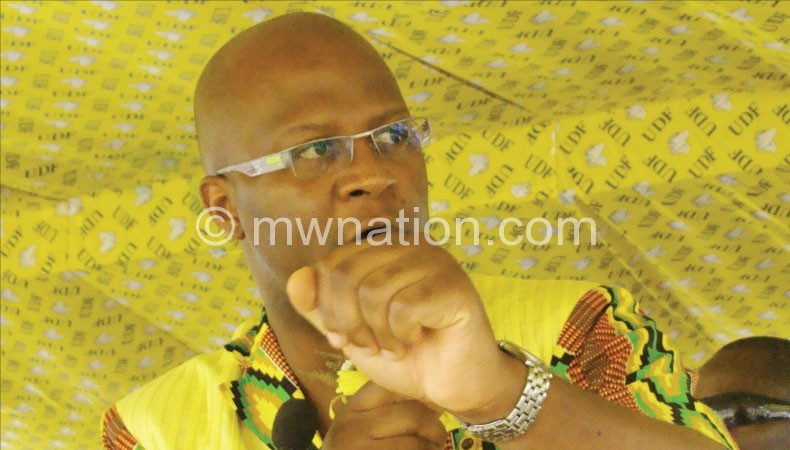Has Atupele pushed udf under the bus?
When President Arthur Peter Mutharika drafted Atupele Muluzi into his Cabinet, there were questions on how the United Democratic Front (UDF) leader would balance the task of leading an opposition party on one hand with that of a government minister.
Even the credibility of the UDF as a formidable opposition party took a knock given how difficult it is for the party to criticize the ruling Democratic Progressive Party (DPP) when its president, Atupele, is part of the administration and decision-making.

While some lauded the appointment of an opposition figure who ran against Mutharika during the May 2014 elections into Cabinet as a sign that the country’s democracy is maturing, others questioned Atupele’s ability to bite the finger that feeds him when it becomes necessary, raising fears that UDF was on its way to oblivion.
Atupele’s Cabinet appointment was followed by some sort of a working relationship between the UDF and the DPP.
The love fest blossomed further as former president and ex-UDF national chairperson BakiliMuluzi—who also happens to be Atupele’s father—made a return to public life and got into good books with Mutharika.
While there are no permanent enemies in politics, the fact that Muluzi Senior once embarked on an anti-DPP crusade raises the question of whether there is more to the working relationship than meets the eye.
Could it be a case of merely satisfying personal goals at the expense of the party which—as a result of the deal Atupele struck—is fast losing its identity?
During his campaign, Atupele championed the Agenda for Change that appealed to the youth with its progressive policies and there was hope that the UDF could reclaim its lost glory.
While the election outcome turned the UDF’s tables upside down and the youth’s expectations went up in smoke as DPP led while the UDF came a distant fourth, there was no question that Atupele would be a formidable political force and, with discipline and patience, could garner a stronger showing in 2019.
But since the appointment, the UDF voice—and Atupele’s as the nation knew it—lost its strength and the party is now just a pale shadow of its former self.
The only prominent person is Atupele himself, but he is only visible under the government banner selling the DPP agenda, not the UDF’s.
Asked to comment on the UDF’s place in the political arena given what appears to be the Atupele-Mutharika deal, two political analysts last week said Atupele’s decision, while good for him personally, is proving to be bad for the UDF.
Said Associate Professor Blessings Chinsinga from the University of Malawi’s Chancellor College: “If you look into these relations, you can see they are negotiated unilaterally by the party president. That has negative consequences because when they are negotiating, they do not look at what the party as a whole is going to benefit, but rather what individuals such as party leaders will benefit, so rifts begin to develop within the junior members.”
As to why the UDF might have agreed to the working relationship, Chinsinga added that it could largely be because the results of the May 20 elections took them by surprise as they expected a much better result due to their clear tackling of issues [within the context of Agenda for Change]. So, after noticing that the UDF is not viable they went into a coalition primarily on Atupele’s terms.”
Commenting on the same, another University of Malawi political commentator, Simbarashe Mungoshi of the Polytechnic said: “Normally, the trend in Malawi is that when smaller parties find themselves in a coalition with a bigger party, they get swallowed up.”
On the issue of the coalitions benefitting mainly individuals at the expense of the entire party, Mungoshi said: “That is where people should ask why everybody is being left out and only a few individuals stand to benefit. The only good that comes out of this is for the government which gains some political stability through better numbers; hence, a much quieter opposition.”
Efforts to talk to Atupele proved futile as he did not pick his calls and his personal assistant promised to get back to us, but did not. Our text messages to Atupele were also not responded to.
But during an interview on one of the local TV stations over the weekend, Atupele said he joined the DPP administration because he was inspired by President Mutharika’s willingness to change the old ways of policy implementation.
He denied letting down the young generation that he excited during the campaign, saying, “The core values that I believe in are still intact.”
On whether the working relationship is a UDF/DPP or APM/Atupele deal, the minister stated that it is a Malawian agenda not a personal one.
Quizzed on how UDF as a party was benefitting from the relationship with the DPP, Atupele rephrased the question, saying it should be how Malawi benefits from the relationship and added: “Politics is a service, so it is not about personal benefits. We now have great opportunities to transform lives.”
UDF spokesperson Ken Ndanga could not be reached for his comments on the party’s stand.
Since Malawian politics smacks of the battle belonging to the swift, the question of whether Atupele has pushed the UDF under the bus is left to time for Malawians to eventually conclude.






Ndizo ndale izo bwaba